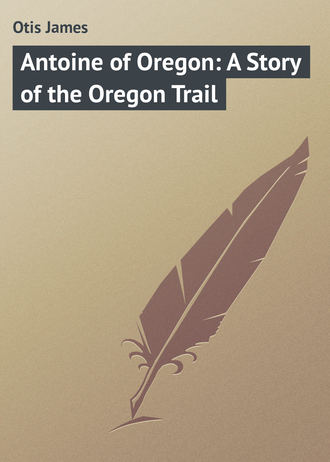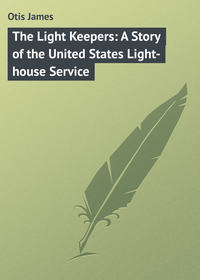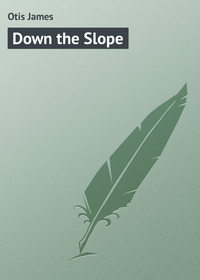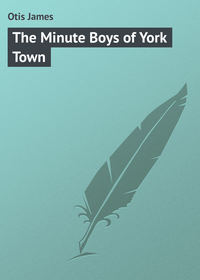 полная версия
полная версияAntoine of Oregon: A Story of the Oregon Trail
Then we rode out of the village. When we were some distance away, John Mitchell asked in a bantering tone if I really expected to see the cows again, whereupon I told him we would not move from the present encampment, save to punish the rascally Pawnees, until every head of the three had been brought to us.
Because he laughed I saw that he believed that he never would see his cattle again; but I was better acquainted with the Pawnees than he.
I GAIN CREDIT AS A GUIDE
Because of all that had happened I found no reason to complain of the manner in which watch was kept over the encampment that night, and at a fairly early hour next morning, even before I had begun to expect them, the Indians came into camp with two of the cows. They talked much about their innocence so far as causing a stampede and claimed that it was not possible to find the third beast.
The Pawnee who acted as spokesman would have tried to make me believe they were simply in sport when they overrode our camp; but I let him know that I was acquainted with such thievish tricks, and threatened them as to the future, much as though I had a company of soldiers at my back.
It may be that the Indians were not greatly frightened by what I said; but certain it is that the members of John Mitchell's company began to believe that I was to be treated less like a boy, and more after the manner of one who knew somewhat regarding the work in which we were engaged.
They gave more heed to my words from that time on, and Susan Mitchell seemed to think I had done some wondrously brave deed when I frightened the cowardly red men, or attempted to; but we never again saw that third cow.
I believe that the Pawnees had hidden her, intending to have a great feast after we had gone away; but I dared not go any farther in the way of threats lest they openly defy me, when I would have been powerless because the men of our company were not equal to fighting the savages.
I could have told Susan that if we had come across a party on the warpath, then my words would have been laughed at, and I might have found myself in serious trouble through making threats which could not be carried into execution.
A DIFFICULT CROSSING
Because of having been thus delayed by waiting for the cattle, we traveled only five miles on this day, which, if I remember rightly, was the 14th of May. Then we arrived where Big Soldier Creek must be crossed, an undertaking I had been looking forward to with no little anxiety because the banks of the creek are very steep and it is impossible to drive either mules or oxen down to the bed of the stream while attached to the wagons.
We were forced to unyoke the oxen and unharness the mules, after which we let the wagons down by means of ropes, with four men to steer the tongue of each cart.
The ford was shallow, but on the other side the banks loomed in front of us like the sides of a cliff. In order to get even the lightest wagon to the top we had to yoke all the oxen in one team, and even then every man of us put his shoulder to the tailboard, pushing and straining as we forced the heavy vehicle straight into the air, as one might say.
One entire day was spent in crossing, and within an hour of sunset we pitched our tents on the high banks, where we let down buckets by ropes in order to get water for cooking, – this method being easier than scrambling up and down the steep incline.
Before night had come a party of about sixty from the Ohio country joined us, having fifteen wagons.
They were unaccustomed to such traveling, as I understood after seeing them make camp. When the leader came up to John Mitchell, proposing that we journey together from then onward, claiming that by thus increasing the numbers each company would be in greater security from the Indians, I gave my employer a look which I intended should say that we would travel as we had started, independently.
WASH DAY
From this point on to the Little Vermilion Creek was eighteen miles over high, rolling prairie, and I believed we ought to make it in one day's travel, which we did.
We arrived at the creek about four o'lock in the afternoon, and within thirty minutes it seemed as if the banks of that small stream were literally lined with fires, over each of which was suspended a kettle filled with water. Tubs were brought out from all the wagons, for the women of our company had decided on making a "wash day" of the three or four hours remaining before sunset.
On seeing that Susan Mitchell was not taking part in this labor, I proposed that we ride five or six miles onward, where I knew would be found quite a large village of Kansas Indians. She was only too well pleased with the proposition, even though having been in the saddle since early morning.
To me one Indian village is much like another; but before we had come to the end of our journey Susan could point out the difference between a Kansas, a Pawnee, a Cheyenne, or a Sioux tepee.
The Kansas Indians make their houses about thirty feet in length by fifteen feet wide, and build them by sticking hickory saplings firmly into the ground in the shape of the lodge desired. These are bent to form an arch eight to ten feet in height, when the tops of the saplings are bound together by willow twigs. This forms the inner framework, which is covered with bark taken from linden trees; over this is another frame of saplings, also tied with willows, to bind the whole together securely and prevent the coverings from being blown away during a high wind.
Each of these lodges has one small door about four feet in height and three feet wide, while at the top of the hut is an opening for the smoke to pass out, when a fire is built in the center of the floor during cold or stormy weather.
INDIAN PICTURES
There were in the village when we arrived but few women and children, with here and there an old man, all the hunters having gone out, as I learned, hoping to find antelopes near at hand.
Understanding by this information that there would be no attempt made to hinder us from gratifying our curiosity, I led Susan into one of the largest of the empty lodges. She was filled with wonder because of the pictures, drawn with charcoal and colored with various paints, which were to be seen on the inside of the bark walls.
There were mounted men fighting with bows and arrows, horses hauling wagons, figures of beasts and reptiles, all done as one can well fancy in a rude way; but to Susan they afforded no little amusement, and she would have remained studying them until after nightfall, had I not insisted that we must return to camp before darkness.
It was an odd picture which our encampment presented when we rode in just at twilight. The women had finished their washing, and, having no ropes on which to stretch their clothes, had hung them on wagon wheels and the tongues of the carts, in fact, on everything available, until the entire place had much the appearance of a gigantic, ragged ghost.
Because so much time was spent next morning in gathering up these garments and packing them away, we traveled only twelve miles, arriving at the bank of a small stream with all the animals, save the saddle horses, showing signs of weariness.
I insisted we should take a day for resting the cattle, although John Mitchell would have pushed on, regardless of their condition; but I knew we must keep them in good shape, else when we arrived at the more difficult portion of the journey they would fail us entirely. Perhaps because of our experience with the Indians, the men failed to grumble at the delay.
A PLAGUE OF WOOD TICKS
Every member of the party was not only willing, but eager, to set out after our long halt, for we had a most disagreeable experience with wood ticks, little insects much like those that worry sheep. They covered every bush as with a veil and lay like a carpet over the ground as far as one could see.
I have never come upon them in such numbers, and before we lay down to rest I wished a dozen times that I had delayed the halt another day.
These ticks fasten themselves to a person's skin so tightly that, in picking them off, the heads are often left embedded in the flesh, and unless carefully removed, cause most painful sores. It was like one of the Plagues of Egypt such as I have heard my mother read about, and so much did our people suffer that John Mitchell came to me in the middle of the night, urging that we break camp at once rather than remain there to be tortured.
I soon convinced him that we could not hope to drive the cattle in the darkness, without danger of losing one or more, therefore he ceased to urge; but before the sun had risen, all our company were astir making preparations for the day's journey.
Early though it was when we set off, only fourteen miles were traveled, owing to the difficulty in crossing the Big Vermilion River.
The banks of the stream were steep and the channel muddy, affording such difficult footing for the animals that we were forced to hew down many small trees and lop off large quantities of branches to fill up the bed of the river before the wagons could be hauled across. All this occupied so much time that after arriving at the opposite bank we traveled only one mile before it was necessary to make camp.
On this night we were not troubled by wood ticks, yet I had the camp astir early next morning, knowing that before nightfall we must cross the Bee and the Big Blue Creeks, therefore much time would be spent in making the passages.
The difficulties which I had anticipated in crossing the creeks were not realized. We got over in fairly good shape, being forced on Bee Creek to double up the teams in order to pull the wagons across, and when night came we were two and a half miles west of Big Blue.
There I believed we should make a long halt, for the country was covered with oak, walnut, and hickory trees, and, if I remembered rightly, this would be the last time we could procure timber for wagon tongues, axletrees, and such other things as might be needed in case of accidents.
ANOTHER TEMPEST
It was well we came to a halt early, for the tents were no more than up and the wagons not yet drawn in a circle to form a corral for the horses, before the most terrific storm of rain I ever experienced burst upon us.
The women had but just begun to cook supper. The first downpour from the clouds quenched the fires, making literal soup of the bread dough, and it was only by building a small blaze under one of the wagons, where it would be partly sheltered from the storm, that we could get sufficient heat to make coffee.
Before this was done – and nearly all us men took part in it, for the storm was so furious that the women could not be expected to remain exposed to its full fury – no less than two hours were spent, and I had almost forgotten that the encampment and all within it were under my charge.
THE CATTLE STAMPEDED AGAIN
Each moment the storm increased, and had I been attending to my duties instead of trying to play the part of cook in order to enjoy a cup of coffee, I would have noticed that the cattle were growing uneasy. After standing with their tails to the storm for a while, they began milling, that is running around in a circle, and by the time I gathered my wits every animal was galloping off across the plain.
Fortunately the horses and mules were properly hobbled, and, in fact, some of the saddle beasts had been brought into the corral formed by the wagons; therefore when John Mitchell would have set off in pursuit of the oxen and cows despite the terrific storm, I insisted that he take such ease in camp as was possible because on the following morning we, mounted, would quickly round up the stampeded cattle.
It was a most dismal night, and for the first time since leaving their homes these people, who were setting their faces toward the Oregon country, had a fair taste of what hardships awaited them.
So furious was the wind that the rain found entrance to every camp and beneath each wagon cover, until beds and bedding were saturated.
Welcome indeed was the morning to my mother and me, for our tent stood in a tiny pond when the day broke, and we waded out to a higher bit of ground, where the gentle summer breeze, now that the storm had cleared away, might dry our water-soaked clothing.
Without waiting for breakfast I saddled Napoleon, calling upon the men to follow me, and within four hours we had rounded up and brought into camp the missing animals.
Then came a hasty meal, and I gave the word to break camp, whereupon John Mitchell reminded me that we were to take in a store of oak and hickory timber for future needs; but I insisted that we push on a short distance, knowing that this wooded country extended ten or twelve miles farther westward, where I hoped to find higher ground, so we might be able to camp with some comfort.
DIFFICULT TRAVELING
The trail was heavy. The rain had so softened the ground that the wagon wheels sank several inches into it, and many times before nightfall we were forced to hew trees and cut large quantities of brush, in order to fill up the depressions in the way where the water stood deep and the bottom was much like a bog.
Again and again we found it necessary to double up the teams in order to haul the heavy wagons over the spongy soil, and after we had traveled eight miles with more labor than on the previous day we had expended in going twice that distance, we decided to encamp.
We were on reasonably high ground, or, in other words, we were not in a quagmire, and after camp had been made I counted that we would spend the following day in getting as much hickory and oak timber as we might need when we came to the mountain ranges, where axletrees, wagon tops, and even the wheels themselves, were likely to be splintered because of the roughness of the way.
Next morning while the men were hewing trees and shaping them roughly into such forms as might come convenient, the women took advantage of the opportunity to churn, and at noon we had fresh butter on our bread, which was indeed a luxury.
We were yet eating slowly in order the better to enjoy the butter, when we saw in the distance, coming toward us, what appeared to be a large body of soldiers and emigrants.
COLONEL KEARNY'S DRAGOONS
Among the foremost of the horsemen who came up and halted near us, was Colonel Stephen W. Kearny who, with three hundred dragoons, nineteen wagons drawn by mules, fifty head of cattle, and twenty-five sheep, was making the first military campaign into the Far West, in order properly to impress the Indians with the strength and power of the Great Father at Washington.
Colonel Kearny would not permit his train to halt where we were encamped, but he remained with us a full half hour, taking his due share of the newly made butter, and eating heartily of our poor store.
It was a most pleasing break in the journey, and to me it was indeed something to be remembered, for never before had I seen or heard of such a number of soldiers so far away from the frontier.
When we set off again all our teamsters pressed forward eagerly, hoping to overtake the dragoons, who had already no less than two hours' start of us.
Perhaps I ought to have checked them, knowing they were forcing our stock at too rapid a pace; but yet I did not, and when next we halted thirty-two miles had been traversed since morning. This, though the way was smooth and the crossings easy, I allowed was a good day's work.
It was on the twenty-sixth day of May, after we had traveled ten miles, that we came to the bank of Little Sandy River, where was already encamped a company of emigrants bound for the Oregon country. They had thirty-two wagons, and, in addition to the other stock, ninety cows, having started from Independence with a hundred.
Susan Mitchell laughed with glee when we arrived at this camp and, when I asked the reason for her high spirits, told me our people could spend the evening visiting these strangers even as they visited their neighbors at home. Indeed, I saw that all the members of the company were prinking and pluming like a party of savages making ready for a war dance.
Men whose clothing had been well-nigh in rags suddenly appeared decked out in finery, and as for the women and the girls, a garden of flowers could hardly have compared with them for variety of colors.
DISAGREEABLE VISITORS
However, our company did not spend the evening visiting the strangers; on the contrary, they were forced to entertain others, for before supper had been cooked and eaten about three hundred Kansas Indians, men, women, and children, some walking, some riding, came into camp.
The emigrants whom our people had intended to visit were overrun even as we were, and during two hours or more the beggars remained watching for an opportunity to steal something, or striving to trade their skeleton-like ponies for our horses and mules.
Some of the visitors were clad in buckskin, others had leggings of elk hide, with buffalo skins over their shoulders, while many wore only greasy, ragged blankets and leggings so besmeared with blood and dirt that one could not tell what the material might be.
Many of the men had long hair, while the heads of others were shaved close to the skin, save for a tuft extending from the forehead over the crown and down to the neck, much like the comb of a rooster.
Some had their faces painted in a fanciful manner with red, while others had only their eyelids and lips colored. Again, there were those with various colored noses or ears, and I failed to see any two who were decked out, either with garments or by paint, in the same manner.
The costumes and decorations of the women were as varied as those of the men, and equally filthy. All, from the smallest papoose to the oldest brave, were repulsive, at least to me, because of their uncleanliness.
DRIVING AWAY THE INDIANS
How long those representatives of the Kansas tribe would have remained with us awaiting an opportunity to steal whatever they might, I cannot say; but at about eight o'clock John Mitchell urged that I drive them away, if indeed I dared. This last suggestion caused me to smile, for what fellow would not dare anything among the Kansas Indians, who know no more of courage than they do of cleanliness?
I speedily sent them out of the camp, and when, next morning, the whole tribe returned begging this or that, I threatened punishment to any who should dare linger around.
Again we had an opportunity to join forces with another company, for those emigrants whom we met at Little Sandy River were eager to journey with us, but intended to remain one full day on the bank of the stream in order to rest their stock.
I urged that we push on, lest they should travel with us whether we wished or not, and so we set off at an early hour across the prairie, arriving next day at the Republican Fork of the Blue River.
It was on the last day of May that we came to where the trail turns abruptly away from the stream, stretching out twenty-five miles or more to the Platte River.
Then we advanced in wild, fertile bottoms, where wild peas abounded, and we were among the last of the oak and hickory trees that we would see for many a long day.
TURKEY HUNTING
Here I knew we might find game, and said to those men who had been eagerly inquiring day after day as to when we would come upon buffaloes, that now was the time when they could display their skill in bringing down wild turkeys.
I had supposed that these people knew somewhat about hunting; but when one of the men turned upon me sharply, asking how I knew turkeys could be found near about, I nearly laughed in his face. For it seemed to me that a child should have known we were come at last to where game of some sort might be taken easily.
I had no idea of hunting turkeys, for I knew that within the next few hours there should be a possibility of bringing down as many antelopes as Napoleon would be willing to carry.
Therefore I remained in camp, and saw those eager hunters striding off amid the timber, making noise enough to warn every fowl or beast of their coming.
The wonder of it was that the fellows brought in a feather; yet at night they returned triumphant and excited, with two turkeys, and one would have believed, from the way the game was displayed, that they had shown great skill.
When Susan Mitchell asked why I did not go out in search of game, I told her it was not for me to spend my time in such sport, but that before many days had passed I would show her what a hunter could and should do in this country.
It may be she thought I was boasting, and I fancied I read as much on her face; but I contented myself in silence, knowing that she soon would see what kind of hunting those, who have crossed from the Missouri River into the Oregon country twice, could do.
EAGER HUNTERS
Next day every man and boy in our company was looking eagerly forward for signs of game, and when, the afternoon being nearly spent, they saw large herds of antelopes in the distance, it was only with difficulty I could force the teamsters to remain on their wagons.
Every horseman would have set off at that time in the afternoon with weary steeds, when there was no possibility of running down the game, had it not been for John Mitchell, who, after talking with me, insisted that no man should leave the company until we had made camp.
The Platte River was to be crossed before we halted, and we needed every man with us, for I knew that the bottom of the stream was soft, and the chances many that we would be forced to double up our teams.
However, we gained the opposite bank without much difficulty and were hardly more than ready to encamp, after having traveled eighteen or nineteen miles, when it began to rain once more, and then the men were glad that they had not set off to hunt at nightfall.
We camped where it would be possible for us to get water without too much labor, and set about gathering fuel before everything was soaked by the rain, and darkness was upon us.
Then the men began to treat me as if I was of their own age. They came into my tent by twos and threes, asking when it would be possible for them to hunt antelopes, and when I would go with them to bring in fresh meat.
I told them that on the next day they should have all the hunting that would satisfy them and their horses, and this caused them to wonder how I knew antelopes might be near at hand.
ANTELOPE COUNTRY
Next morning, when we had traveled no more than six miles, any hunter could see that we were in a game country, and because our people were really in need of fresh meat, to say nothing of the desire of the men for sport, I gave the word to halt and make camp.
John Mitchell angrily demanded why I had halted the company before the forenoon was half spent.
When I told him that here was our opportunity to get antelope steaks for supper, he looked at me as if he believed I was talking of something wholly beyond my knowledge. I have an idea he would have countermanded my order to form camp, insisting that we move on, had not his wife suggested that now we were so near the river, where the bank was shelving instead of steep, it would be a good time for the women to finish washing their clothing.
After she had spoken he said to me: —
"Very well, lad, you may show the other men your antelopes. I have no desire for a wild-goose chase across the prairie."
I gave little heed to his banter, and those who had been so eager for the hunt were right willing to follow me on the chance that they might come upon something that could be killed; John Mitchell finally consented to go with us, in order, as he said, to hear what sort of excuse I would make for not finding game.
We rode straight away from the river, and within half an hour came upon a herd of from twenty to thirty antelopes feeding less than three miles away, whereupon every member of the company would have started off singly, taking the poor chances of getting a shot, had I not insisted they should hold themselves under my orders, lest there be no possibility of bringing in fresh meat that day.











